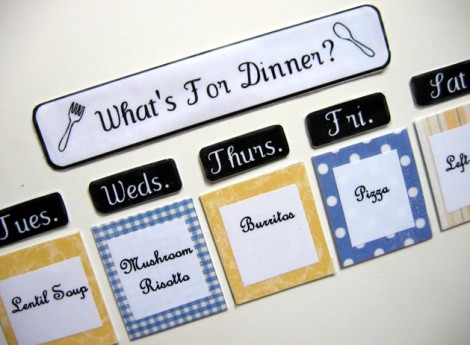 Meal planning saves money. And it is the one thing I am absolute rubbish at. One reason is because I still haven't accepted that I'm a grown up now. I have a child, a career, a mortgage. I'm chair of the PTA. But still, inside, I think I'm going to go to all night raves and sleep till noon.
Meal planning saves money. And it is the one thing I am absolute rubbish at. One reason is because I still haven't accepted that I'm a grown up now. I have a child, a career, a mortgage. I'm chair of the PTA. But still, inside, I think I'm going to go to all night raves and sleep till noon.
Having forked out on a takeaways for four nights last week, for the adults in the household, I realised I might as well be standing on the street corner handing out my cash to passersby.
Somehow it is always easier to throw together a meal for my son from scratch. Partly because I don't worry about its contents so much during the week as he gets a lovely fully cooked school dinner at lunchtime. But not so easy to co-ordinate things for the adults, since we all eat at different times. My other half works lates during the summer, so I have a choice of eating with him, or with son. And most of the time I do neither and just have a piece of toast.
Sound familiar?
I made it my mission then to find out exactly how you can make meal planning easy.
 Create a meal plan
Create a meal plan
Yawn. This is the first hurdle I fall at. I simply cannot think of anything more boring. But even worse that that is standing in front of the fridge at 6pm with no clue whatsoever on what I am going to cook and a rumbling tummy.
My friend Jane, mum to four, advises doing your meal plan and your shopping list at the same time. She reckons it should take no more than half an hour at the most if you start out properly. This means having a folder for the purpose. Put in it your most commonly used recipes, vouchers, pencil and paper. One sheet for the meal planning, and one for the shopping list.
"I also include leftovers in my meal plan. And I try to work in food that is close to its expiration dates." says Jane. Really though her most helpful advice was to look for back up recipes that are fast and use the same or similar ingredients. "I never know how wretched I'll be feeling at the end of the day, so I keep a back up plan. A meal that will take just minutes to throw together or can be done in a way that's faster. For example, I grill sausages because that's much healthier but keeping an eye on them keeps me in the kitchen. My backup plan here is to pop them in tinfoil with a bit of oil and bake them in the oven. Takes longer but I don't have to keep watching and turning them."
 Keep to a shopping schedule
Keep to a shopping schedule
I tend to shop on an ad hoc basis. I've always figured that this was the sensible thing to do. Bulb buy all the non-perishables to save money, and pick up fruit and vegetables when needed to save on having to throw out unused food.
However, I've been a bit wrong about that. According to Connie, mum to three, one problem with doing little shops for things like that is having to get to the shops every two to three days. "Have a busy week and your cupboard is bare."
If you've created a meal plan, you can work out a shopping schedule and vice versa. This way you know when the bread is likely to finish, for example, and you can schedule in a meal that uses up stale or slightly old slices of bread. Like baked french toast.
Knowing what is in your cupboard
Bulk buying is a great way to save cash especially when you see deals that you can stock up on. However one danger is that, in having bought so much rice for example, you forget you've bought it. Idling in the supermarket aisle you think, hey its been ages since I last bought rice. And before you know it you're trundling home with another, unneeded, bag of it.
You can also save a lot of money by buying things like pulses dried. These are cheaper, but then if you're like me, you end up with bags of them used because they need to be soaked over night. And you don't remember that until you go to cook a meal. Before I know it I've forgotten that I have a bag of split yellow peas in the cupboard, until I go to put the next bag of split yellow peas in there.
Sarah, mum of one but foster mum to anything from one to three extra children, explains that "you don't need to sit there taking an inventory every time you need to go shopping. I use a notebook for my household stuff and put lots of things in there but the most crucial is a quick sketch out of the meals I want to cook. This means I just need to do a quick look in the cupboard, and I can cross off the foods I don't need to buy."
 From the experts
From the experts
Above is advice I gleaned from my friends with large families. And when there's five or more of you, making sure every penny is counted and every bite of food is eaten is essential. I'm fairly sure that they know what they're doing. Here it is in summary:
- include left overs in your meal plan
- have backups; easy to make, meals that use same ingredients
- write shopping list at same time as meal plan
- include shopping dates in your meal or family calendar
- look in the cupboard as you write your shopping list

 Create a meal plan
Create a meal plan Keep to a shopping schedule
Keep to a shopping schedule From the experts
From the experts














Comments